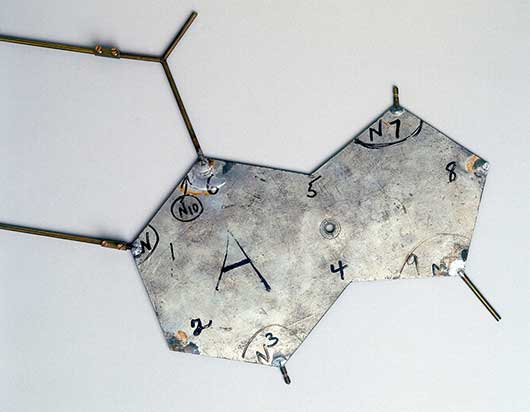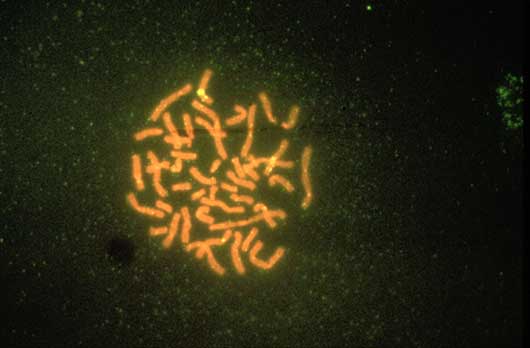This topic takes on average 55 minutes to read.
There are a number of interactive features in this resource:
 History
History
 Biology
Biology
It is impossible to say how medicine will develop over the rest of the century but undoubtedly our knowledge of genetics will be of great importance.

Watson and Crick built their model of DNA using templates like this one to show how the molecules in DNA were arranged
The task was to find the sequence of DNA for every single gene in a complete set of human chromosomes. We call this sequence the human genome. It started in 1990 and saw unprecedented scientific collaboration between research laboratories in the United States, Europe, Asia and Australia. Using highly automated analytical techniques, the task was completed in 2003, which was barely 50 years after Watson and Crick first described the double helix structure of DNA.
Some surprising discoveries were made. The instructions for an entire human is held in only about 20,500 different genes and all but a few percent of these are common to our nearest relatives, the chimpanzees. There is still much more to be done to understand what each of these different genes do.
The risk of developing many disorders, such as Alzheimer's, diabetes and heart disease, may well be influenced by our genetic make-up. Greater understanding of the human genome has enabled the development of medicines to help treat and prevent diseases, as well as identifying those treatments that could work best for patients based on their genetic make-up.
Aided by advances in genetics, Advanced Therapy Medicinal Products (ATMPs) have the potential to revolutionise the way diseases are treated and to transform the lives of patients.
The first Advanced therapy medicinal product (ATMP) was approved in the European Union in 2009.
Many of these products are given as a single one-off treatment offering life-long benefits to patients and are sometimes potentially curative. They can offer significant savings to the NHS by reducing or eliminating the need for complex, or long-term care for some patients.
ATMPs include cell, gene, tissue-engineered and somatic-cell therapy medicines. They treat the root cause of diseases and disorders by augmenting, repairing, replacing, or regenerating organs, tissues, cells, genes and metabolic processes in the body.
There is significant investment in the UK to support ATMP development; £3.8bn since 20121.

Human chromosomes stained with a fluorescent dye. The sequence of bases A, G, C and T hold the genetic information.
Advances in medical science will not come without challenges.
Throughout the ages, medicine has been influenced by the spiritual and superstitious beliefs of the day. Knowledge built up over the centuries has led to modern treatments that are based on a molecular understanding of how the body works. The ethical and moral concerns of modern society will continue to shape the development of new medicines and treatments.
It is impossible to prevent all diseases. Bacteria are evolving resistance to antibiotics and viruses evolve resulting in infections such as outbreaks of swine flu in 2009-10, ebola in 2013, zika virus in 2015-16 and, COVID-19 which The World Health Organization declared a global pandemic on 11th March 2020.
As life expectancy rises, fresh challenges will emerge in the treatment of the elderly. One issue that medicine alone cannot tackle is to raise the living conditions of people throughout the world so that they do not suffer from diseases of poverty. As always, modern medicine will continue to face fresh challenges and find new solutions for the 21st Century.
The video below, ‘Only Just Begun’ summarises the history of the UK pharmaceutical industry in changing the lives of patients, and celebrates the people involved in its past, present and future.
Reference:
1. High Value Manufacturing Catapult Annual Review 2020/21 2020-2021 - HVMC (catapult.org.uk)